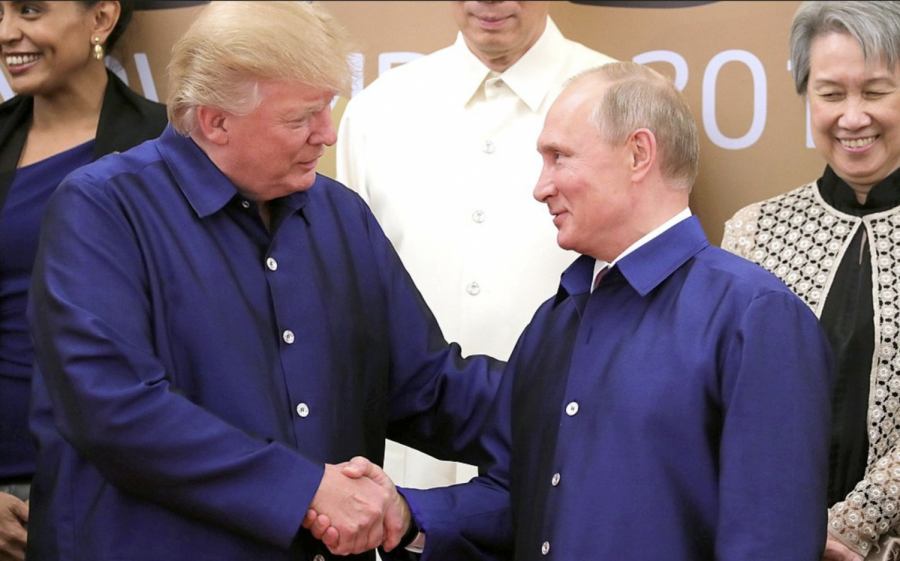Is Trump Putin’s Puppet?
KREMLIN VIA WIKIMEDIA
Putin’s Middle Eastern agenda is seemingly aided and abetted by Trump — from top to bottom.
December 4, 2019
President Trump has always had a close professional relationship with Russian President Vladimir Putin. Over the past three years, Trump has looked the other way when it came to Russia, and it seems that Trump is carrying out Putin’s will. From disclosing classified intelligence to Russian officials (this was legal) to belittling his own intelligence and security agencies, Trump has favored Russia over his own country.
These subtle concessions to Russia all pale in comparison to Trump withdrawing from Syria, abandoning our Kurdish allies and paving the way for a Russian-dominated Middle East.
The main questions that need to be answered are: How deep a connection does Trump have with Putin? Does Putin have any blackmail material? What is Putin hoping to gain from Trump?
It seems that Trump has a personal relationship with Putin, but I do not believe that this is truly a friendship. This bond resulted from past dealings that Trump had in Russia, and Trump does not want those deals to become public knowledge. In 2016, President Obama placed sanctions on Russia in order to punish the country for trying to interfere in the election. Putin was obviously furious with these sanctions, and his anger was most likely relayed to the Russian ambassador. Michael Flynn, former United States national security advisor, was contacted by the ambassador, and, within two days, Putin announced that he would not respond to the sanctions.
It is believed through phone calls released to the press that Flynn reassured the ambassador who reassured Putin that Trump was about to be president, implying that their problems would be gone as soon as he took office.
While it may not be enough to say that this interaction is evidence of some sort of collusion between Trump and Putin, these phone calls raise some suspicions as to the relationship between Trump and Russia. It is also important to note that, within two days, Putin even came out with a public statement clarifying that Russia would not retaliate against the sanctions.
It is not clear what Putin has over Trump, but these recent relocations of troops are an indication of what Putin might want. From a general standpoint, Putin has been interested in extending Russia’s influence in the Middle East. Since Trump’s evacuation of U.S. troops from northern Syria, Russia has deployed military police in the area in an attempt to stop the advances of the Turkish and Syrian governments. More importantly, Russia has been taking the old U.S. bases left behind from the removal of U.S. troops.
The implication of a Russian-backed Middle East are grave for the United States. As Russia gains more control, there is a possibility that oil prices might be significantly affected. Regionally, the United Arab Emirates, one of the oil-producing Gulf nations, has already shown signs of support for Russia. Iran, a known enemy to the United States, is also a close Russian ally. Syria is now poised to be dominated by Russia, as President Putin has repeatedly provided troops and jets to President Bashar al-Assad in order to fight various rebel groups and ISIS.
In the aftermath of a U.S. withdrawal, Turkey has begun a military incursion into northern Syria near the border towns, their advance no longer kept in check by the presence of American troops. Our long-standing allies, the Kurds, looked to Syria, the same government that has continuously denied their claims to autonomy and has engaged in human rights abuses against this minority, to help position their military along these border towns.
As American hegemony begins to decline, Russia might aim to consolidate its allies in the region. This newfound decisive effort will most likely be the gateway for the total control of oil prices in the region. For the United States and its Western allies, higher oil prices result in a deterioration of our oil-driven economies. Professor Jean-Marc Oppenheim of Fordham College Lincoln Center had some thoughts about this issue. “I think regional allies of the U.S. are actually looking to Russia for support instead of the U.S. because of the Trump administration’s erratic behavior towards policies.” According to Professor Oppenheim, the Trump Administration is completely going against many of the policies of previous presidents, which he believes to be a mistake.
For the past 16 years, the United States has left a rather dominant footprint on the countries of the Middle East. It seems strange that we would leave a territory we have known for so long. At the moment, it is unclear whether this removal of troops is an attempt by Trump to maintain his policy of isolationism or whether he is actually in cahoots with Putin. In numerous instances, Trump has sought to preserve his relationship with Putin over interests of his country. The continuous support for various Russian endeavors and the reluctance to punish Russia for illegal actions should be an indication, at the very least, of shadowy background deals occurring between the President of the United States and the President of the Russian Federation.












Carol Geiger • Nov 18, 2020 at 1:54 pm
Obviously I’m not the only one who believes Trump is working for Putin. He’s a traitor but-will probably never be tried. Why?!
Carol Geiger • Nov 18, 2020 at 1:41 pm
Putin got him elected, Trump’s working for Putin. It’s that simple. God help us!